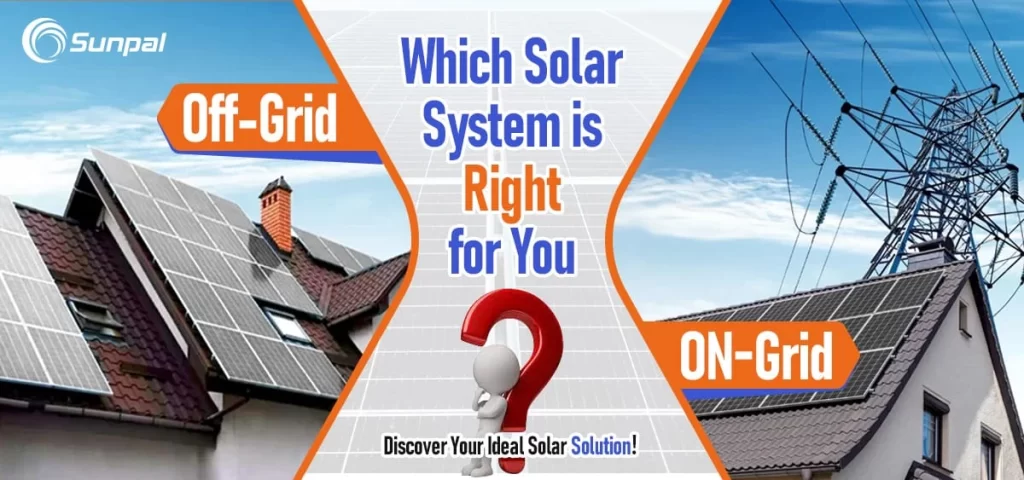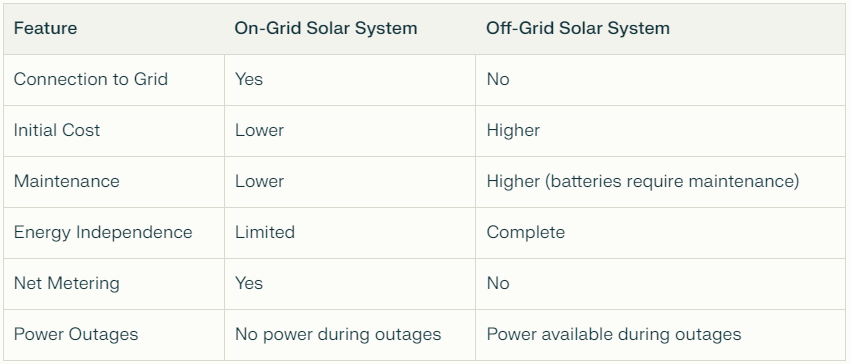
Sie überlegen, auf Solarenergie umzusteigen, wissen aber nicht, ob Sie sich für ein netzgebundenes oder ein netzunabhängiges Solarsystem entscheiden sollen?
Sie sind nicht allein. Dies ist ein häufiges Dilemma für viele Hausbesitzer und Unternehmen, die sich die Kraft der Sonne zunutze machen wollen.
Die Wahl der richtigen Solaranlage kann Ihre Energieunabhängigkeit, die monatlichen Kosten und die allgemeine Zufriedenheit mit Ihrer Investition erheblich beeinflussen.
In diesem umfassenden Leitfaden erläutern wir die Unterschiede zwischen netzgebundenen und netzunabhängigen Solarsystemen, ihre Vor- und Nachteile und helfen Ihnen bei der Entscheidung, welche Option für Ihre spezifischen Bedürfnisse am besten geeignet ist.
Unter Sunpal SolarWir haben es uns zur Aufgabe gemacht, qualitativ hochwertige Solarlösungen anzubieten, die auf die unterschiedlichsten Energieanforderungen zugeschnitten sind.
Tauchen wir ein in die Details!
Verständnis von netzgekoppelten Solarsystemen
Was ist ein netzgekoppeltes Solarsystem?
Ein netzgekoppeltes Solarsystem, auch bekannt als netzgebundenes System, wird direkt an das Stromnetz angeschlossen.
Auf diese Weise können Sie die von Ihren Modulen erzeugte Solarenergie nutzen, während Sie bei Bedarf weiterhin Zugang zum Stromnetz haben.
Schlüsselkomponenten von On-Grid-Solarsystemen
Netzgekoppelte Systeme bestehen in der Regel aus mehreren Schlüsselkomponenten:
- Sonnenkollektoren: Diese Paneele fangen das Sonnenlicht ein und wandeln es in Strom um.
- Wechselrichter: Dieses Gerät wandelt den von den Paneelen erzeugten Gleichstrom (DC) in Wechselstrom (AC) um, der im Haushalt verwendet wird.
- Zähler für Versorgungsleistungen: Misst die verbrauchte Strommenge und verfolgt die Net-Metering-Gutschriften.
- Anschluss an das öffentliche Stromnetz: Ermöglicht Net-Metering und Notstromversorgung bei Bedarf.
Vorteile von On-Grid-Solarsystemen
1. Kosteneffizienz: Aufgrund der geringeren Anzahl von Komponenten ist die Installation in der Regel kostengünstiger als bei netzunabhängigen Systemen.
2. Vorteile von Net Metering: Sie können Gutschriften für überschüssige Energie erhalten, die ins Netz zurückgespeist wird, und so Ihre Gesamtstromkosten senken.
3. Geringere Wartungskosten: Da es weniger Komponenten wie Batterien gibt, ist der Wartungsaufwand minimal.
4. Sofortige Einsparungen: Sobald Ihr System betriebsbereit ist, können Sie sofort mit der Einsparung von Energiekosten beginnen.
Nachteile von On-Grid-Solarsystemen
1. Abhängigkeit vom Raster: Bei einem Stromausfall haben Sie keinen Strom, es sei denn, Sie haben ein Batterie-Backup.
2. Begrenzte Energieunabhängigkeit: Sie bleiben bei der Deckung Ihres Energiebedarfs auf das Versorgungsunternehmen angewiesen.
3. Mögliche Tarifänderungen: Künftige Änderungen der Stromtarife können sich auf Ihre Ersparnisse auswirken.
Verständnis für netzunabhängige Solarsysteme
Was ist ein netzunabhängiges Solarsystem?
Ein netzunabhängiges Solarsystem arbeitet unabhängig vom Stromnetz.
Das heißt, Sie erzeugen Ihren gesamten Strom und speichern ihn in Batterien, um ihn bei Bedarf zu nutzen.
Schlüsselkomponenten von netzunabhängigen Solarsystemen
Netzunabhängige Systeme umfassen in der Regel:
- Sonnenkollektoren: Fangen das Sonnenlicht ein und wandeln es in Strom um.
- Wechselrichter: Wandelt Gleichstrom von Panels in Wechselstrom für den Hausgebrauch um.
- Batteriespeicher: Speichert überschüssige Energie zur Nutzung an bewölkten Tagen oder in der Nacht.
- Laderegler: Reguliert die Batterieladung, um ein Überladen oder Entladen zu verhindern.
Vorteile von netzunabhängigen Solarsystemen
1. Energieunabhängigkeit: Sie erzeugen und speichern Ihren gesamten Strom und sind damit weniger abhängig von Energieversorgungsunternehmen.
2. Zuverlässige Stromversorgung: Sie haben auch bei Stromausfällen Strom, da Sie nicht an das Stromnetz angeschlossen sind.
3. Ideal für abgelegene Standorte: Perfekt für Haushalte in Gegenden ohne Zugang zur Stromversorgung.
4. Nachhaltigkeit: Bietet eine nachhaltige Energielösung, die mit umweltfreundlichen Werten in Einklang steht.
Nachteile von netzunabhängigen Solarsystemen
1. Höhere Anfangskosten: Die Installationskosten sind in der Regel höher, da zusätzliche Komponenten wie Batterien benötigt werden.
2. Wartungsanforderungen: Batterien müssen gewartet und gegebenenfalls ausgetauscht werden, was die langfristigen Kosten in die Höhe treiben kann.
3. Begrenzte Energieversorgung: Sie müssen Ihren Energieverbrauch auf der Grundlage der Speicherkapazität sorgfältig verwalten, was den Verbrauch in Spitzenzeiten einschränken kann.
Hauptunterschiede zwischen netzgekoppelten und netzunabhängigen Solarsystemen
Wenn Sie sich für ein netzgebundenes oder ein netzunabhängiges System entscheiden, sollten Sie diese wesentlichen Unterschiede berücksichtigen:

Welches System ist das richtige für Sie? Zu berücksichtigende Faktoren Ob ein Netzgekoppeltes Solarsystem oder eine Off-Grid Sonnensystem ist Besser
Die Entscheidung zwischen einer netzgebundenen und einer netzunabhängigen Solaranlage hängt von mehreren Faktoren ab:
1. Standort und Erreichbarkeit des Netzes
Wenn Sie in einem abgelegenen Gebiet ohne Zugang zum Stromnetz leben, ist ein netzunabhängiges System möglicherweise Ihre einzige Option.
Wenn Sie hingegen in der Nähe einer zuverlässigen Stromquelle wohnen, könnte ein netzgebundenes System vorteilhafter sein.
2. Haushalt und finanzielle Anreize
Berücksichtigen Sie Ihr Budget:
- Netzgekoppelte Systeme sind im Allgemeinen von vornherein kostengünstiger.
- Achten Sie auf lokale Anreize oder Rabatte, die für beide Systemtypen gelten können.
3. Energiebedarf und Verbrauchsmuster
Bewerten Sie Ihren Energieverbrauch:
- Wenn Sie einen hohen Energiebedarf haben, kann ein netzunabhängiges System eine umfangreiche Batteriespeicherung erfordern, die kostspielig sein kann.
- Mit einem netzgekoppelten System können Sie während der Spitzenverbrauchszeiten Strom aus dem Netz beziehen, ohne sich Gedanken über die Speicherkapazität machen zu müssen.
4. Überlegungen zum Lebensstil
Überlegen Sie, wie oft Sie zu Hause sind:
- Wenn Sie häufig unterwegs sind, ist ein netzgebundenes System möglicherweise bequemer, da es bei Bedarf automatisch Strom aus dem Netz bezieht.
- Wenn Sie die Selbstversorgung bevorzugen und in einer abgelegenen Gegend leben, könnte eine netzunabhängige Lösung besser zu Ihren Werten passen.
Fallstudien: Beispiele für netzgekoppelte und netzunabhängige Solarsysteme aus der Praxis
Werfen wir einen Blick auf einige Beispiele aus der Praxis:
Beispiel 1: Installation im Wohnbereich (netzgekoppelt)
Eine Familie installierte eine netzgekoppelte Solaranlage mit den hocheffizienten Modulen von Sunpal Solar.
Sie profitieren von Gutschriften aus dem Net Metering und haben gleichzeitig eine niedrigere monatliche Stromrechnung.
An sonnigen Tagen produzieren sie mehr Energie als sie verbrauchen und speisen den Überschuss ins Netz ein.
Wichtige Punkte:
- Unmittelbare Einsparungen bei den Stromrechnungen
- Reduzierter Kohlenstoff-Fußabdruck
- Zuverlässiger Zugang zu Strom auch an produktionsschwachen Tagen
Beispiel 2: Abgelegene Kabine (Off-Grid)
Ein Ehepaar baute eine Hütte in einer abgelegenen Gegend ohne Zugang zu Strom.
Sie entschieden sich für ein netzunabhängiges Solarsystem mit Batteriespeicher von Sunpal Solar.
Auf diese Weise können sie moderne Annehmlichkeiten genießen, ohne auf externe Stromquellen angewiesen zu sein.
Schlüssel Punkte:
- Vollständige Energieunabhängigkeit
- Fähigkeit, an abgelegenen Orten nachhaltig zu leben
- Individuell anpassbare Energielösungen, die auf ihren Lebensstil zugeschnitten sind
Zukünftige Trends in der Solartechnik
Die Zukunft der Solartechnik sieht vielversprechend aus!
Hier sind einige Trends, die Ihre Entscheidung zwischen netzgebundenen und netzunabhängigen Systemen beeinflussen könnten:
Fortschritte in der Batterietechnologie
Es entstehen neue Batterietechnologien, die eine längere Lebensdauer, schnellere Ladezeiten und eine höhere Effizienz bieten.
Dies könnte netzunabhängige Systeme attraktiver machen, da die Speicherung billiger und zuverlässiger wird.
Zu den Innovationen gehören:
- Lithium-Ionen-Batterien mit verbesserter Leistung
- Intelligente Batterien, die den Ladevorgang anhand des Nutzungsverhaltens optimieren
- Verbesserte Recyclingverfahren für ältere Batterien
Integration intelligenter Stromnetze
Mit der Entwicklung intelligenter Netze werden netzgebundene Systeme von fortschrittlichen Überwachungs- und Verwaltungsfunktionen profitieren, die es den Hausbesitzern ermöglichen, ihren Energieverbrauch weiter zu optimieren.
Vorteile von intelligenten Netzen:
- Überwachung des Energieverbrauchs in Echtzeit
- Dynamische Preismodelle, die helfen, Geld zu sparen
- Verbesserte Zuverlässigkeit durch automatische Reaktionen auf Ausfälle
FAQs über On-Grid & Off-Grid Sonnensystems
1. Was ist der Hauptunterschied zwischen netzgebundenen und netzunabhängigen Solarsystemen?
Der Hauptunterschied besteht darin, dass netzgebundene Systeme an das Stromnetz angeschlossen sind, so dass die Nutzer bei Bedarf Strom beziehen und überschüssigen Strom gegen Gutschriften zurücksenden können. Im Gegensatz dazu arbeiten netzunabhängige Systeme unabhängig mit gespeichertem Batteriestrom.
2. Welches System ist kostengünstiger?
Im Allgemeinen sind netzgekoppelte Solarsysteme von vornherein kostengünstiger, da sie keine teuren Batteriespeicherlösungen benötigen, wie dies bei netzunabhängigen Systemen der Fall ist.
3. Kann ich meine Geräte auch bei einem Stromausfall mit einem netzgebundenen System benutzen?
Nein, normale netzgebundene Systeme liefern bei Stromausfällen keinen Strom, es sei denn, sie sind mit einem Batterie-Backup-System ausgestattet.
4. Wie entscheide ich, welches System das richtige für mich ist?
Berücksichtigen Sie bei Ihrer Entscheidung Faktoren wie Standort, Budget, Energiebedarf und die Frage, ob Sie unabhängig von Energieversorgern sein wollen.
Schlussfolgerung: Die beste Wahl treffen zwischen Netzgekoppeltes Solarsystem und Off-Grid
Die Entscheidung, ob eine netzgebundene oder eine netzunabhängige Solaranlage besser ist, hängt letztlich von Ihren spezifischen Bedürfnissen, Ihrem Standort, Ihrem Budget und Ihren Lebensstilvorlieben ab.
Beide Systeme bieten einzigartige Vorteile, die auf unterschiedliche Situationen abgestimmt sind.
Unter Sunpal SolarWir bieten innovative Lösungen, die auf Ihren Energiebedarf zugeschnitten sind - egal, ob Sie sich für eine netzgebundene oder netzunabhängige Anlage entscheiden.
Wenn Sie bereit sind, Ihre Energiezukunft selbst in die Hand zu nehmen und gleichzeitig erhebliche Einsparungen bei den Stromrechnungen zu erzielen, ist es jetzt an der Zeit, Ihre Möglichkeiten zu prüfen!
Sie können Solarmodule von einem zuverlässigen Hersteller direkt über unsere Website kaufen. sunpalsolar.de.
